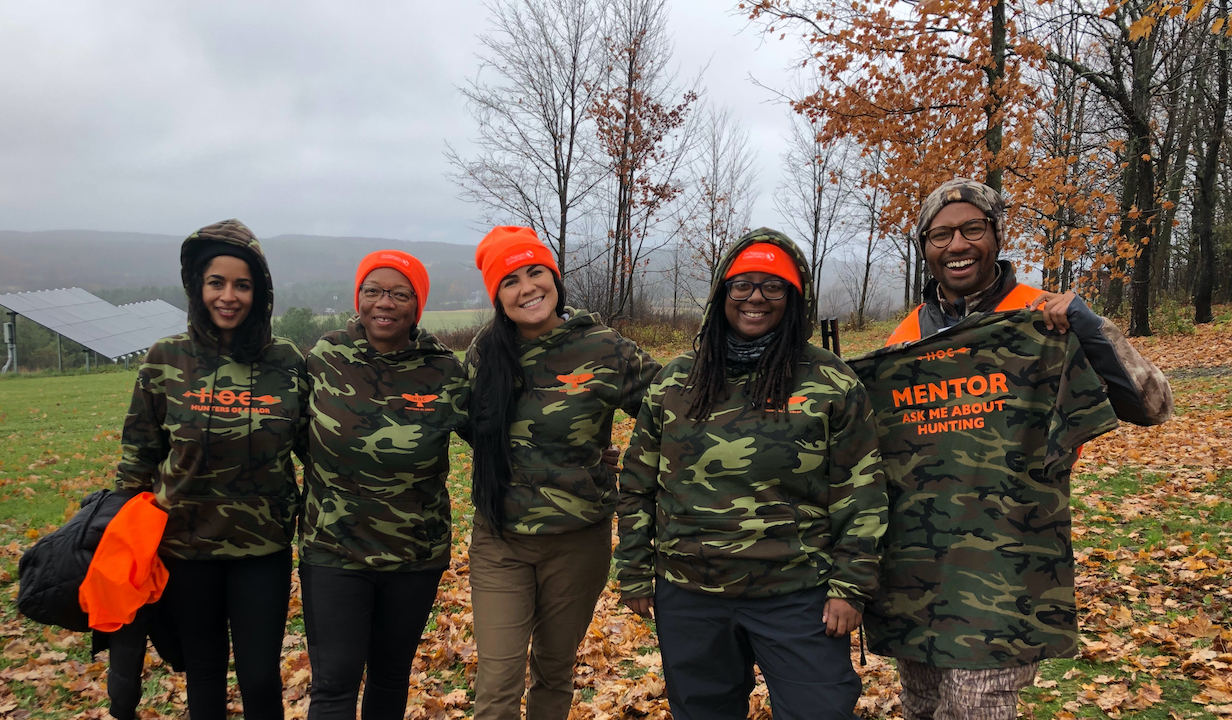
- Details
- By Jenna Kunze
Hunters of Color is an organization hosting workshops and mentorship opportunities for Black, Indigenous, and people of color to get reconnected with the outdoors for the sake of conservation, food sovereignty and preservation of ancestral traditions.
Lydia Parker, Mohawk, co-founded the organization in 2020.
“We say we’re re-connecting people to the outdoors,” Parker, who serves as the group’s executive director, told Native News Online in a Zoom interview from her home in Oregon. “I hear people say ‘introduce’ and that’s not the correct terminology at all because we’ve been out here…and it’s in all of our blood as people of color—but especially as Indigenous peoples— to have these connections to the Earth. And so we're trying to reconnect or restore those connections to the outdoors.”
Want more Native News? Get the free daily newsletter today.
Despite its Native origins, hunting in the United States today is an overwhelmingly white-dominated space: less than 4% of all hunters identify as people of color, according to US Fish and Wildlife Services.
Some barriers include: expensive gear, permitting, and lack of access to lands. Census numbers show that over 70 percent of Indigenous people live in urban areas, which means that many Native youth never have the opportunity to subsistence hunt on the land the way their ancestors did.
“My impetus for starting Hunters of Color is always making sure that Indigenous people have these connections to our cultures,” Parker said. “Some of the biggest issues that…Indigenous kids face in school is feeling like they don't have an understanding of who they are because those lifeways or the ceremonies or traditions have been taken away through forced removal and through living in diaspora.”
Last fall, the group took eight mentees from New York City to hunt white tailed deer on Mohawk land near what is now Albany, New York, on the Hannacroix Ravine Preserve through a collaboration with The Nature Conservancy in New York.
Parker—who herself learned to hunt in her early 20s alongside Hunters of Color’s other co-founders—said the group also focused on preparing the meat, and the ceremony surrounding animal sacrifice.
“There’s a colonized mindset present prevalent in a lot of Western hunting that puts humans above nature…and that mindset allows you to dominate nature,” she said. “That’s something we’re trying to decolonize. We say we have an agreement with nature, we’ll take care of her, she'll take care of us.”
Home-sourced meat also allows Indigneous people access to their traditional diets.
“We're talking about food sovereignty, being able to make a decision to procure sustainable, hormone-free meat,” Parker said.
Hunters of Color offers similar programming in states including Oregon, New York, Arkansas, and California. This weekend, they’ll host a pheasant and hunt March 11-13th in Omaha, Nebraska. Next month, they’ll host a turkey hunting workshop in Oregon, and this fall they’ll host another hunting mentorship in New York state.
BIPOC identifying individuals interested in learning how to hunt, or becoming a mentor to teach others, can apply on the group’s website. Participation is free.
More Stories Like This
Bard College Center for Indigenous Studies (CfIS) Hosts Annual Symposium With Keynote Speaker Miranda Belarde-Lewis on March 9–10American Indian College Fund Announces Spring 2026 Faculty Fellow Cohort
Navajo Nation Signs $19 Million Diné Higher Education Grant Fund Act into Law
Dr. Shelly C. Lowe to Be Inaugurated as IAIA President March 26–27
Tlingit Language Courses Expand for Students to Learn With Families At-Home
Help us defend tribal sovereignty.
At Native News Online, our mission is rooted in telling the stories that strengthen sovereignty and uplift Indigenous voices — not just at year’s end, but every single day.
Because of your generosity last year, we were able to keep our reporters on the ground in tribal communities, at national gatherings and in the halls of Congress — covering the issues that matter most to Indian Country: sovereignty, culture, education, health and economic opportunity.
That support sustained us through a tough year in 2025. Now, as we look to the year ahead, we need your help right now to ensure warrior journalism remains strong — reporting that defends tribal sovereignty, amplifies Native truth, and holds power accountable.
 The stakes couldn't be higher. Your support keeps Native voices heard, Native stories told and Native sovereignty defended.
The stakes couldn't be higher. Your support keeps Native voices heard, Native stories told and Native sovereignty defended.
Stand with Warrior Journalism today.
Levi Rickert (Potawatomi), Editor & Publisher

